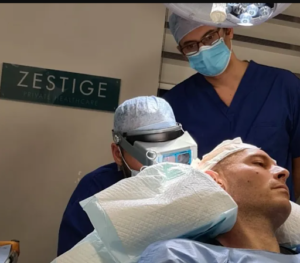What 5 Medications Cause Hair Loss: Everything You Need to Know

Hair loss is a common concern that can stem from a variety of factors—one of which is medications. While many associate hair loss primarily with treatments like chemotherapy, there are a variety of other drugs that can also trigger hair thinning or shedding. This type of hair loss, known as drug-induced alopecia, can be troubling for both men and women.
If you have recently started a new medication and noticed more hair in the brush or shower drain, your prescription could be contributing to the issue. Below, we’ll explore how medications can lead to hair loss and discuss five specific types of drugs that may be responsible.
How Do Medications Cause Hair Loss
Medications can lead to hair loss by interfering with the normal growth cycle of hair follicles. Most hair loss from medication occurs due to one of two types:
- Telogen Effluvium: This temporary hair loss happens during the resting phase of the hair cycle, leading to shedding. Hair usually regrows once the medication is discontinued.
- Anagen Effluvium: This occurs during the active growth phase and often causes more severe and longer-lasting hair loss, affecting not only scalp hair but sometimes body hair as well.
5 Medications That May Cause Hair Loss
After getting to learn how drugs increase hair loss. Now the question comes is What medications cause hair loss. The answer is:
1. Anti-Clotting Drugs
Anti-clotting drugs, also known as anticoagulants, help prevent blood clots in the body but may cause hair loss through telogen effluvium. These drugs typically induce hair shedding within a few months of starting the medication.
If you experience hair loss on an anti-clotting drug, speak with your healthcare provider to discuss potential alternatives or dosage adjustments, especially if you are pregnant or breastfeeding.
2. Antidepressants
Certain antidepressants and mood stabilisers can trigger telogen effluvium, especially those prescribed to manage mood disorders like depression and anxiety. Some medications in this category include selective serotonin reuptake inhibitors (SSRIs) and serotonin-norepinephrine reuptake inhibitors (SNRIs).
For those experiencing hair loss on antidepressants, adjusting the dosage or switching to another medication may help. Consult your healthcare provider before making any changes to ensure safe treatment adjustments.
3. Weight Loss Drugs
Weight loss medications can also contribute to hair loss, especially if they suppress appetite significantly. Reduced appetite can lead to decreased calorie intake, which may mean lower nutrient levels necessary for hair growth.
Although weight loss medications themselves may not list hair loss as a side effect, individuals using these drugs should be mindful of their nutrient intake to prevent potential deficiencies that could impact hair health.
4. Antibiotics
Some commonly prescribed antibiotics, including certain types of penicillin, have been linked to hair shedding. Antibiotics work by eliminating harmful bacteria in the body, but they also affect beneficial bacteria in the gut. When gut bacteria are disrupted, it can hinder the body’s ability to synthesise essential nutrients, such as those from the B vitamin complex, that are vital for hair growth.
If hair loss occurs while taking antibiotics, it’s worth discussing your options with a doctor, as they may suggest additional vitamins or supplements to support your hair and overall health.
5. Chemotherapy
Chemotherapy medications, which are designed to target rapidly growing cancer cells, are one of the most common causes of drug-induced hair loss. These drugs can cause a more aggressive form of hair loss (anagen effluvium) that typically affects both scalp and body hair.
Although chemotherapy-related hair loss can be significant, it is usually temporary, with regrowth beginning three to six months after completing treatment. Some people choose to undergo treatments like scalp cooling during chemotherapy, which can help reduce hair loss.

What is Zestige’s Approach to Treat Hair loss caused by Medications
Our approach to treating hair loss caused by medications is focused on personalised care, targeting both the underlying cause and the restoration of hair health. Here’s an overview of their approach:
-
Comprehensive Consultation
We begin with an in-depth consultation to understand the specific medication and individual patient profile. This helps identify whether the hair loss is likely to be temporary or long-lasting and determines the most appropriate treatment plan.
-
Medication Review & Collaboration with Healthcare Providers
Working alongside the patient’s primary care provider, Zestige reviews the medication in question. If possible, they coordinate to explore alternative medications or adjust dosages that may lessen the impact on hair growth.
-
Nutritional Support
Since nutrient deficiencies can exacerbate hair loss, especially with medications that reduce nutrient absorption, we recommend a nutrient-rich diet, often supplemented with vitamins essential for hair health, such as B vitamins, iron, and zinc.
-
Topical Treatments and Scalp Therapy
To stimulate regrowth, we use topical treatments like minoxidil or specialised scalp therapies. These treatments aim to create a healthy scalp environment, encouraging dormant follicles to re-enter the growth phase.
-
Advanced Hair Restoration Options
For those with more significant or persistent hair loss, we offer hair transplant procedures, like the Harley Street hair transplant. This advanced option provides a natural and permanent solution tailored to the patient’s needs.
-
Ongoing Support and Monitoring
Recognising that hair restoration is a gradual process, our experts provide ongoing support and regular check-ins to monitor progress and make adjustments to the treatment plan as needed.
This holistic, multi-faceted approach enables us to address the specific needs of those experiencing hair loss due to medications, offering both short-term relief and long-term results.

Managing and Treating Drug-Induced Hair Loss
If you suspect that a prescribed medication is causing hair loss, consult with your healthcare provider. They can review your treatment plan and discuss alternative medications or dosing adjustments. Often, hair will regrow once the medication is discontinued or switched.
In cases where hair loss does not reverse naturally, treatments like hair transplants may be considered. Harley Street hair transplant clinics specialise in advanced procedures for hair restoration. This option could be ideal for individuals who find that their hair isn’t growing back despite stopping the medication.
Final Thoughts
Medications are essential for managing various health conditions, but some may have unwanted side effects, including hair loss. By understanding which drugs can cause this issue, you can work with your doctor to explore ways to minimise its impact.
If you are concerned about persistent hair loss and considering a more permanent solution, Zestige Private Healthcare offers consultations on hair transplant procedures to help you make informed decisions. Contact us today for a no-obligation consultation to discuss potential treatment options tailored to your needs.








